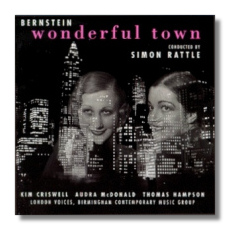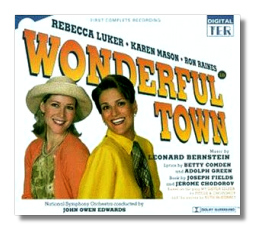
The Internet's Premier Classical Music Source
Related Links
- Bernstein Reviews
- Latest Reviews
- More Reviews
-
By Composer
-
Collections
DVD & Blu-ray
Books
Concert Reviews
Articles/Interviews
Software
Audio
Search Amazon
Recommended Links
Site News
 CD Review
CD Review
Leonard Bernstein

Wonderful Town
1999 Studio Cast
- Kim Criswell (Ruth)
- Audra McDonald (Eileen)
- Thomas Hampson (Robert Baker)
- Brent Barrett (Wreck)
London Voices
Birmingham Contemporary Music Group/Simon Rattle
EMI CDC556753-2 66:46
Also available on EMI 67136:
Amazon
- UK
- Germany
- Canada
- France
- Japan
- ArkivMusic
- CD Universe
- JPC
or on EMI/Gramophone 518175:
Amazon
- UK
- Germany
- Canada
- France
- Japan
- ArkivMusic
- CD Universe
- JPC


First Complete Recording
1998 Studio Cast
- Karen Mason (Ruth)
- Rebecca Luker (Eileen)
- Ron Raines (Robert Baker)
- Gregg Edelman (Wreck)
National Symphony Orchestra/John Owen Edwards
Jay CDJAY2-1281 2CDs 59:09 + 40:17
Summary for the Busy Executive: Wonderful show.
It all began when Ruth McKenney wrote a series of short stories about her and her sister's adventures in Greenwich Village, when they moved from Ohio to New York. Ruth was the "smart, serious one," Eileen the "pretty and naïve one." Actually, in reality they were probably both fairly smart. After all, Eileen married the novelist Nathanael West. Ruth married humorist S. J. Perelman. In 1938, she collected these stories under the title My Sister Eileen. Joseph Fields and Jerome Chodorov adapted the work for the Broadway stage in 1940, and the play duly became a movie. Fields and Chodorov then decided to turn it into a musical. The history of the project's start is a tangled one, with various producers, stars, and songwriters considered and either dropped or fallen through. Comden and Greene and Bernstein all came in at the last minute, with any where from four to six weeks (depending on who counts) to write the score. Comden and Greene were initially less than enthusiastic, but when they pitched the idea to Bernstein, he immediately lit up. As their earlier On the Town was initially "about" the Forties, Wonderful Town was "about" the Thirties, essentially their adolescence. One resists the times of one's own youth with difficulty. They strongly attract most of us. Bernstein reminded Comden and Greene of the heady combo of social fervor and swing and thus galvanized all three into some of their best work.
They wound up writing the show as a vehicle for Rosalind Russell. The musical also introduced Edie Adams as Eileen. It ran a respectable number of performances and then sank into oblivion, with the curious exception of the song "Ohio," one so out of the run of what Bernstein normally wrote that you'd be hard pressed to associate it with him. Still, like all of Bernstein's Broadway stuff, it's so much better than even the acclaimed classics you have to wonder about the level of public taste. Because of the speed required, the team fell back to some extent on their cabaret style. All three had worked during their salad days in night-club reviews. The show overflows with hilarious musical skits and comic songs. On the other hand, they also came up with three beautiful ballads – "A Little Bit in Love" (my favorite), "A Quiet Girl," and "It's Love" – all in Bernstein's pop-kicked-up-several-notches style. None of these songs made it, and the CDs are worth having for these alone. I've known most of the score for many years, having owned the original cast LP. This has reportedly appeared on CD, but I can't find it now.
Both CDs have their glories and their problems. On EMI, Simon Rattle, that superb musician, not only has Broadway pop down but the ability to get tremendous playing from his musicians. Each note crackles and sparkles. Rattle swings naturally. Jay's John Owen Edwards leads a professional performance, but one typical of what you hear from a Broadway pit band. Compared to Rattle, he's pokey and stiff. You really notice the difference in the number "Swing!" Rattle does and Edwards doesn't. In fact, Edwards and his band sound as if they learned the score phonetically. On the other hand, the EMI has serious casting problems. There's nothing wrong with anyone's voice – Hampson, McDonald, and Criswell all sing very well indeed. On the other hand, the score really demands comedians who can sing. Rosalind Russell, after all, had a baritone croak, and her Ruth Sherwood blows both Criswell and Mason out of the water. Mason does better than Criswell, mainly because she knows how to tell a joke, read a line, and sell a song without overkill. It amazes me that Bernstein compromised very little, even when dealing with a non-singer like Russell. Ruth's numbers are rhythmically and harmonically quite tricky. It somewhat spooked Russell, according to the liner notes. She ran to her friend Joshua Logan in high panic ("Help! I can't sing!"). Logan advised her to get "lots of words," under the theory that the audience would be too busy with the words to make out the music. Indeed, Ruth's numbers have as many words as a G & S patter song – especially "Conga," which runs through a list of Thirties monuments, fads, and 15-minute celebs (Helen Wills, NRA, TVA, Charles G. Dawes, Harold Teen, Dizzy Dean, and even "Stokowski's hands"). It seems to have worked and given Russell the confidence she needed. She came through in spades. Hampson is no more than okay in his numbers, and his acting is more enthusiastic than deft. Ron Raines has a much better sense of theater style, although he too is no Phil Silvers. Audra McDonald as Eileen has a more beautiful voice than Rebecca Luker, and she really needs only her voice. The minor characters – essentially vaudeville clowns – really disappoint. EMI's Brent Barrett affects an amateur theatrical All-Purpose Dumb Guy voice for the football player Wreck. His counterpart, Gregg Edelman, does slightly better, with a professional theatrical All-Purpose Dumb Guy. Both miss the massive egotism and sweet amazement of the original, Jordan Bentley, in his lovely paean to himself, "Pass the Football":
Couldn't spell a lick,
Couldn't do arithmetic;
one and one made three,
thought that dog was C-A-T,
but I could pass that football
like nothin' you have ever seen.
Couldn't write my name,
couldn't translate "Je vous aime,"
Never learned to read
"Mother Goose" or André Gide…
– a lovely vernacular update of the Penzance Major-General's song. Overall, even the Jay cast lacks the comedic sharpness of performances honed by lots of evenings and matinees in front of a live audience, as in the original cast album.
Comden and Greene at their wittiest make a strong case for this show. Bernstein's score makes it a marvel. He contributes at least as much wit as his lyricists. When one considers how little time he had, the unity and surprises of the score turn all the more amazing. From the Eddie Duchin vamp that heralds the opening number, "Christopher Street," the score immediately transports us to the Thirties. "Swing!" evokes Louis Prima's "Sing, Sing, Sing" and Fats Waller without ever a direct quote. There are several musical tags. "Pass the Football" opens with the refrain from the number "What a Waste," thus commenting on Wreck's college career before we ever hear a word. "Conversation Piece," depicting an impromptu pot-luck thrown by Eileen where every conversational gambit crashes to the floor like a sash weight, includes the opening phrase of Eileen's innocent "A Little Bit in Love." "What a Waste" opens with the leading man's advice to Ruth to go back home, to a phrase which later blossoms into his ardent "It's Love." Best of all are the narrative dance numbers, a genre that runs through all of Bernstein's shows: "Conquering the City" (not included in the original cast album) and "Ballet at the Village Vortex." If you listen hard to "Conquering," you can hear a phrase that found its way into Bernstein's concert tribute to swing, Prélude, Fugue, and Riffs.
Overall, I'd give Rattle the clear edge as far as the music goes, Edwards the better cast. However, the Jay recording also includes just about everything, including instrumental reprises, instrumental covers of scene changes, the curtain-call music, and the exit music that played while the audience left the theater. Most, if not all of this, is probably by the orchestrator, Don Walker, rather than Bernstein. Not a theater historian myself, I could care less about any of it except for the bit called "Ruth's Stories." Ruth wants to be a writer and submits her serious short stories to a literary editor. What we get are hilarious parodies of Hemingway, Dos Passos, and the school of Philip Barry. It's hard to choose. Ideally, you really want all three performances: the original cast, the EMI, and the Jay.
Copyright © 2001, Steve Schwartz



















